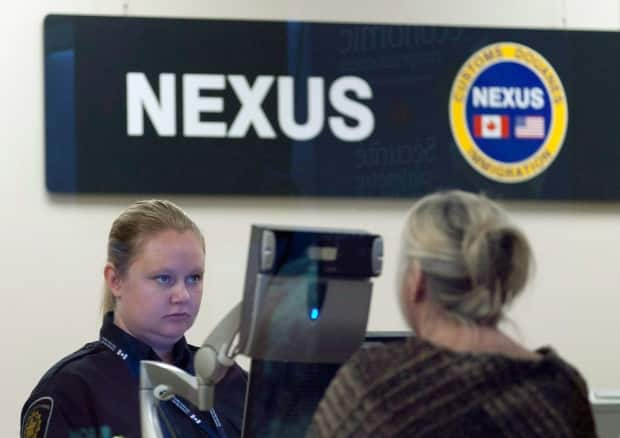U.S officials have revoked thousands of Canadian NEXUS cards

American authorities have revoked the NEXUS trusted traveller cards of thousands of Canadians over the past five years — more than three times the number revoked by Canadian officials, CBC News has learned.
And experts say that if a Canadian's NEXUS card is revoked by American officials, it's difficult to appeal the decision or get it reversed.
"Very, very few have been successful and in the last year and a half, it has been almost impossible" said Toronto lawyer Cyndee Todgham Cherniak.
The NEXUS trusted traveller program, run jointly by the Canada Border Services Agency (CBSA) and U.S. Customs and Border Protection (CBP), allows card holders to fast-track through customs and speed through airports. While many use the cards for cross-border travel, some card holders use it primarily for reducing wait times while travelling within Canada.
The CBSA said there were 1.7 million NEXUS card holders as of May 2021. According to the CBP, 77 per cent of those with NEXUS cards are Canadian, 21 per cent are American and 2 per cent fall in the category of "other".
But while Americans make up a smaller percentage of members, numbers obtained by CBC News show that American officials are responsible for 77 per cent of NEXUS card revocations.
Canadian and American officials revoked 15,807 NEXUS cards between Jan. 1, 2016 and May 25, 2021. The CBSA says it revoked 3,591 cards — 22 per cent of revocations — while American CBP officials revoked 12,216 cards.
CBP spokesperson Rhonda Lawson said the service cannot say how many of the cards the American agency revoked were held by Canadians and how many belonged to Americans.
But overall, she said, 70 per cent of the cards revoked by either the CBSA or the CBP were held by Canadians, 26 per cent of the revoked cards were held by Americans and 4 per cent of those whose cards were revoked fell into the category of "other".

Lawson said those whose cards are revoked, or whose applications are denied by American authorities, can appeal to the CBP's ombudsman.
Todgham Cherniak said that's not as easy as it sounds.
"There isn't a robust, transparent process to appeal a NEXUS card confiscation or cancellation by the U.S. officials."
Todgham Cherniak won a recent Federal Court of Canada case in which a judge found that a Montreal businessman should not have lost his NEXUS card due to a minor infraction. The judge also ruled that it was incumbent on government officials to explain why a minor infraction caused them to lose trust in him.
While there is a process for Canadians or Americans whose NEXUS cards are revoked by the CBSA, it's difficult to even reach the CBP ombudsman, she said.
"Last year we had a situation for a number of Canadians where we sent a paper copy of the submissions to the old U.S. CBP ombudsman address," she said. "They were all returned because they moved.
"So we picked up the phone and called U.S. Customs and Border Protection. Nobody within Customs and Border Protection knew where they had moved to. They didn't know the new person to write to, or how to get in touch with anybody."
Retired lawyer Ruth Hornstein tried to appeal to the ombudsman when her newly-renewed NEXUS card was revoked at Montreal's Trudeau airport in 2018 because a friend travelling with her had an apple and an avocado in her purse — a violation of U.S. agricultural rules.
"They said, 'I'm sorry, you can't have your NEXUS card back, it has been revoked for life,'" she said.
Zero tolerance
Robert Leo, a New York lawyer who has represented Canadians whose NEXUS cards were revoked by American authorities, said the Americans adopted a zero tolerance policy long ago.
"Anything that is out of the ordinary at the border, they take away the NEXUS card," he said.
It isn't easy to appeal the decision to revoke a card, he said.
"There are no regulations in the United States, unlike Canada," said Leo, adding that CBP has rejected the idea of adopting regulations. "There are no procedures other than now you can ask for reconsideration of a customs decision online."
Leo, who estimates his firm wins about 30 per cent of the appeals it files, said those looking to file an appeal should first use the Freedom of Information Act to get copies of their files. A track record of crossing into the U.S. without violations before or after the incident can also help, he said.
"The one thing that somebody has to prove is that they were a trusted traveller before, they are a trusted traveller now and this was an aberration," said Leo.
Todgham Cherniak said she would like the Canadian government to get involved and urge the American government to improve its appeal process.
"What we really need to do is have the Canadian government reach out to the U.S. government saying, 'This isn't fair,'" she said.
Elizabeth Thompson can be reached at elizabeth.thompson@cbc.ca

